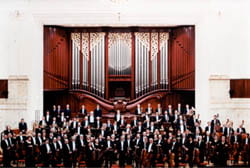A symphonic concert commemorating the 50th Anniversary of the events of March 1968—during which an anti-semetic purge drove as many as 20,000 Jews from Poland—was held on March 6 at the Warsaw Philharmonic Concert Hall. The Warsaw Philharmonic Orchestra performed with Danish-Israeli violinist Nikolaj Znaider, under the baton of Artistic Director Jacek Kaspszyk. The program included Violin Concerto No. 1 in G Minor, Op. 26 by Max Bruch and Symphony No. 4 in A minor, Op. 61 by Mieczysław Weinberg.
Co‑organizers of the concert were Internationellt Kulturforum Sweden, Zikaron – Memory – Pamięć, Social‑Cultural Association of Jews in Poland.
Max Bruch spent most of his life working as a teacher of conducting in several German cities (he was most closely associated with Berlin), as well as in Liverpool, where he spent several seasons as a guest conductor at the local philharmonic. Bruch’s relatively rich oeuvre attracted only lukewarm interest, as he, like Brahms, was rather conservative in his compositions, and preferred classical forms to new German modernism, which was favored by the critics. Nonetheless, at least one of his works has gone down in history: Violin Concerto in G Minor, which is admired for the perfect balance of its form, its virtuosity (the texture of the violin owes much to Bruch’s own consultations with the great Joseph Joachim) and its Romantic, post‑Mendelssohnian expressiveness, is now part of the violinist’s “canon”.
Mieczysław Weinberg was brought up in pre‑war Warsaw and it was here that he also began his musical education and work. At the beginning of the Second World War he settled in the USSR, where he developed his career (which was not easy, bearing in mind that oppressive regime’s ever changing policy on clemency), while in his home country he remained a forgotten figure for a long time. In 2014, the Warsaw Philharmonic Orchestra made a critically acclaimed recording, which Jacek Kaspszyk, the conductor and artistic director of the Warsaw Philharmonic, advertized in an interview with the following words: “I was wondering what this album would be like. I decided that it should include not only Polish music, but Polish music that has not been fully exploited. We have observed a revival of Mieczysław Weinberg’s music in the world, and I believe that this is the right moment to begin precisely with him […] Weinberg was Shostakovich’s protégé. The latter regarded him as one of the most brilliant composers of his generation. Of the more than twenty symphonies left by the composer, I would like to begin with the one most outstanding – Symphony No. 4.”
March 6, 2018 | 7:00 p.m.
50th Anniversary of March 1968 Commemoration Concert
Warsaw Philharmonic Concert Hall
Jasna 5, 00-950 Warsaw, Poland
Tickets & Info: filharmonia.pl
[Source: polmic.pl]
